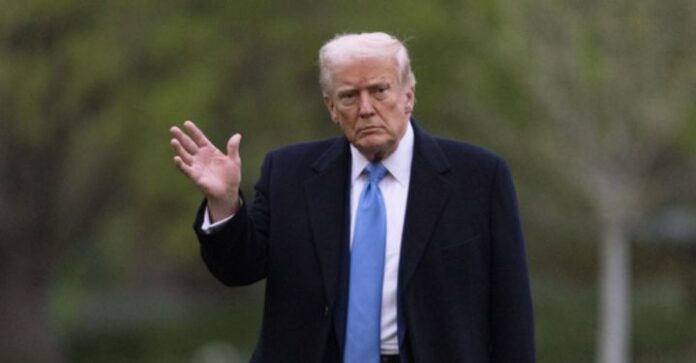Former President Donald Trump has always been a figure who stands firm in his political beliefs, and his stance on trade tariffs remains no different. In the midst of growing market volatility, Trump reiterated his unwavering commitment to his tariff policies, stating bluntly, “What’s going to happen, I can’t tell you.” His statement came as a direct response to concerns that the tariffs he previously imposed on various foreign goods might be exacerbating the economic uncertainty.
The global economy has been in flux, with rising inflation, fluctuating stock prices, and supply chain disruptions that seem to have no immediate end in sight. In this environment, many analysts have looked to Trump’s tariff policies as a potential factor contributing to the economic instability. However, the former president has remained steadfast, refusing to back down from the tariffs he put in place during his tenure, arguing that they are a vital tool in ensuring American economic independence.
At the heart of Trump’s stance is a deeply held belief in the importance of protecting American manufacturing and jobs. Throughout his presidency, he frequently invoked the concept of “America First,” arguing that fair trade agreements would boost U.S. industries and reduce dependence on foreign imports. His tariffs, he claimed, were meant to pressure foreign countries, particularly China, to adhere to fairer trade practices.
Despite the market’s occasional downturns and the potential risks associated with his trade policies, Trump has maintained that they are necessary to confront the long-standing trade imbalances the U.S. has with countries like China. Trump’s tariffs on Chinese goods, in particular, were among the most controversial of his trade policies. The tariffs led to a significant shift in the relationship between the two economic giants, raising concerns about a prolonged trade war.
The Ongoing Debate Over Tariffs
Critics of Trump’s tariff policies argue that they led to higher prices for American consumers, as the costs of imported goods increased. Furthermore, these tariffs have been blamed for creating tensions in global trade, with countries retaliating against the U.S. through their own set of tariffs. The ongoing trade war has had ripple effects on the global supply chain, causing disruptions that many businesses are still trying to navigate.
Some economists argue that the tariffs served to create short-term pain for long-term gain, particularly in industries that had been decimated by cheap foreign imports. Others, however, suggest that Trump’s aggressive tariff strategy has simply acted as a tax on American consumers and businesses without achieving the desired outcomes of reshaping international trade relations.
Despite these criticisms, Trump has remained firm. His most recent comments about not being able to predict the future in terms of how his policies will play out in the market seem to suggest that he’s fully aware of the risks involved but believes the long-term benefits outweigh the immediate challenges. For Trump, the battle for fair trade practices and economic sovereignty is worth the uncertainty.
The Impact on Global Markets
In recent weeks, the stock market has been volatile, with both national and international investors grappling with concerns over inflation, geopolitical tensions, and a potential recession. The uncertainty has been further exacerbated by ongoing discussions about tariffs, particularly with China, and how these policies will affect global supply chains. Trump’s refusal to back down from his tariff stance has raised questions about the future of trade relationships and the economic landscape.
The U.S.-China trade war has not only impacted bilateral relations between the two countries but has also caused ripple effects across the global economy. Both nations are significant players in the global trade network, and any disruptions to their trading practices are felt worldwide. As a result, businesses that depend on international trade are grappling with increased costs, delays, and shortages.
Market analysts have warned that the continued tariff policies could further destabilize an already fragile global economy. However, Trump’s supporters argue that his trade strategy was designed to shift the balance of power back toward the U.S. and that the benefits will become more apparent over time. Despite the uncertain market conditions, Trump’s belief in the strength of his policies remains unshaken.
Trump’s Legacy and the Future of Trade Policies
As Trump continues to maintain his position on tariffs, it’s worth examining his legacy in terms of trade policy. The tariffs he imposed were among the most aggressive in modern U.S. history and served as a major departure from the trade policies of previous administrations. Whether these policies will be remembered as a bold move to protect American workers or as an economic misstep remains to be seen.
Regardless of one’s perspective on his approach, Trump’s impact on U.S. trade policy is undeniable. His policies have set the stage for a new era in international trade, one where tariffs and trade wars may be more common than ever before. In this environment of unpredictability, it’s clear that Trump’s legacy will continue to shape U.S. trade policy for years to come.

